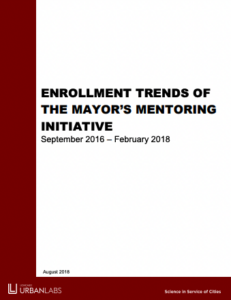Mentoring and Counseling Interventions
Mayor’s Mentoring Initiative (MMI)

The Mayor’s Mentoring Initiative (MMI) originated under Mayor Rahm Emanuel’s administration to deliver and scale up intensive mentoring services to young people affected by violence in Chicago. The Education Lab partnered with the City of Chicago and the Department of Family Support Services – as well as 54 grantee mentoring organizations, including the City’s anchor partner, Youth Guidance- to assist in the design and implementation of the initiative.
Challenge
In 2016, Chicago experienced a surge in violence across the city, leaving policymakers scrambling for a way to prevent violence and support young people affected. While Education Lab research shows that behavioral science-informed mentoring programs for youth are effective in reducing violent crime arrests, at the time they served a relatively small number of Chicago students.
Opportunity
With an investment of $36 million of additional funding to expand existing mentoring programs, the MMI represented an opportunity to scale up proven programs to reach more students who could benefit. Linking and analyzing data from Chicago Public Schools, the Chicago Department of Family and Support Services, and the Chicago Police Department, the Education Lab provided crucial insight to help prioritize resources for those who needed them most.
Project overview
Launched in 2016, the Rahm Emanuel administration’s Mayor’s Mentoring Initiative included an investment of $36 million in public and private funds, pledged over three years, to scale up support for youth affected by violence in Chicago.
Education Lab research on behavioral science-informed mentoring interventions, such as Becoming a Man, showed the promise of these interventions at a relatively small scale, but they did not yet serve as many youth who could potentially benefit from programming. MMI was an opportunity to rapidly expand these programs to serve even more students, but MMI programs needed information to effectively identify and reach potential participants.
To assist with the scale-up effort, the Education Lab helped the City of Chicago identify neighborhoods experiencing the highest rates of gun violence and then estimate the number of 7th-10th grade boys – the states target population for the initiative – in each community area and in what schools they were clustered. This information helped the 54 delegate agencies for the initiative plan for staffing, recruiting, and reporting on dosage.
Using data from delegate city agencies, including Chicago Public Schools, the Chicago Department of Family and Support Services, and the Chicago Police Department, the Education Lab also helped provide customized initiative and agency-level reports for each of the 54 MMI delegate agencies to understand 1) whether resources were going towards the targeted student population, 2) how much mentoring services each student was receiving, and 3) what the outcomes of youth that participated were. These data were not meant to be evaluative or punitive, but rather help agencies better target city resources towards young people who might benefit most, support and improve data literacy of delegate organizations, and spur continuous improvement among the ecosystem of public sector and non-profit partners using data.
Key findings from the study include:
- Almost all MMI enrollees (99%) resided or attended school in one of the 22 high-violence community areas designated by MMI.
- Compared to the average 7th to 10th grade male CPS student, MMI enrollees were.
- 2.3 times as likely to have experienced homelessness
- 2.3 times as likely to have at least one arrest
- 2.4 times more likely to have experienced crime victimization
- The total number of youth who attend MMI programming each month has gradually increased over time, from 66 youth in September 2016 to 2,270 youth in January 2018. 52% of MMI participants spend more than 5 months in MMI programming, while 17% attend for one month or less. The median MMI participant receives 2.5 hours of mentoring a month.
The Education Lab used data to confirm that MMI served its target population of youth who had experienced more adversarial outcomes than their peers. The Education Lab helped to design this approach to better target resources with the aim of improving equity.
Years Active
2016 – 2019
Project Leads
Monica Bhatt
Senior Research Director


Enrollment Trends of the Mayor’s Mentoring Initiative
This report looks at youth enrolled in the Mayor’s Mentoring Initiative (MMI) to inform understanding of who MMI agencies were recruiting and enrolling.
